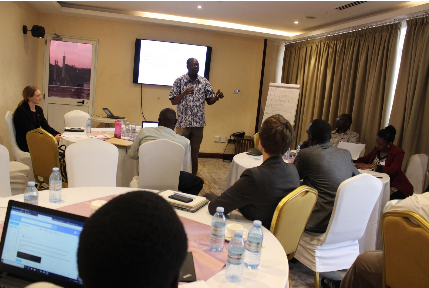AfrII in partnership with Conservation International (CI) successfully convened the “Essential Ecosystems for Climate and Sustainable Development” meeting that was held on Tuesday 6th November 2018 at Golden Tulip Hotel in Kampala, for stakeholders to identify and recommend opportunities for incorporating ecosystems into national and sub national planning for climate change and sustainable development in Uganda.
The purpose of the meeting was to present highlights of the findings on a study jointly conducted by AfrII and CI on Uganda’s NDCs and get stakeholder feedback after they review the findings.
“We carried out this work through close engagement with you as key stakeholders and partners. We therefore need you all to engage in assessing the results so as to get your views and thoughts on whether it is relevant and also look into how it can be applied and what more is needed because this is important work for the country since Uganda depends a lot on agriculture” said Dr. Peter Alele, the Africa Field Director at Conservation International, while addressing the participants.
The meeting objectives were to; discuss the importance of natural capital in development and climate change, share research on natural capital mapping and policy gaps, identify strengths and weaknesses of natural capital approach and Articulate next steps for addressing information and policy gaps.

CI’s Dr. Pamela M. Collins (standing) presents to stakeholders’ findings on the role of forests in climate and sustainable development
Meanwhile, The AfrII Chairman Prof. William Otim-Nape mentioned the need for a data integration process to improve data sharing among government departments and the private sector. “Data is essential as a basis for policy decisions but it remains scattered across government institutions and private companies and users cannot readily access it. It is important therefore that we have an integrated data system to have the available data sourced for by the different institutions placed into this common pool to be readily and easily accessible by anyone in order to achieve sustainable development.”
The meeting was attended by various stakeholders including officials from the Ministries of Agriculture, Water and Environment, The National Environment Management Authority (NEMA), National Forestry Authority (NFA), National Agricultural Research Organization (NARO), Uganda National Bureau of Statistics (UBOS), Makerere University, selected NGOs, private sector and international development partners.






Leave a Comment